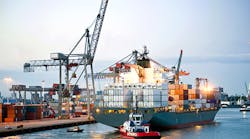Midway through 2008, you might ask yourself if we aren’t reliving some former year: 2004, perhaps, or 2000, or any of the election years when witless experts conjured the idea that what lay ahead was “the most important election of our lifetimes.”
Some of us with longer memories might wonder if we aren’t reliving some past decade: the late 1970s, perhaps, when fuel supplies were tight and costs were rising. Foreign competition was haunting automakers and their suppliers. And, organized labor was giving manufacturers little room to maneuver as they pursued their performance targets.
It’s no illusion. This so-called historic year really is a rehash of old themes. Issues that we might have thought were settled are with us still, and must be readdressed or reconfirmed because they involve timeless concerns, ones we must face in order to understand who we are and what we principles we affirm.
That might sound a little too sober, but if so it just balances the daily anxieties of market meltdowns and energy crises. Remember, as hopeless as any of these problems seem, we’ve seen them before.
To begin, take the surge in energy prices. It is a supply shortage, after all, and just like the artificially instituted energy crises of 30 years ago, it will be resolved by solutions on the supply side. It may be necessary to channel demands in different ways, and some consumers may choose to alter their consumption. But, global demand for every major energy commodity (crude oil, natural gas, electricity) has reached unprecedented levels, and these are business opportunities that will be served. Serving the demand may not be as simple or as cheap as we’d want, but have no doubt that the effort will lead to new business opportunities, too.
The threat that foreign competition poses to domestic manufacturing is just as strong as it was in the 1970s, but it’s entering a new phase. Then, foreign manufacturers tried to compete on price alone, so the challenge to domestic producers became to raise the quality of their products. Later, the focus shifted to service and reliability. Then, the standard changed to innovation. All these factors still matter, but there are new frontiers of performance for domestic manufacturers to conquer: it may be “sustainability,” or “product lifecycle management,” or some measurable standard still to be identified. Again, it won’t be simple, but the new standard will be identified, and the manufacturers that do so will profit by it.
Problems of resources and enterprises will be resolved because they can be quantified, but human dilemmas defy prediction. Domestic manufacturers’ recurring problems with labor will not be solved soon, certainly not before the current political cycle unfolds. As much as these disputes seem to involve compensation, they are the latest evaluation of the purpose of enterprise and the role of workers. Labor leaders have a bold and expansive agenda, which in many ways is inimical to productivity. We know what Labor wants — influence, permanence — but we don’t know what Labor will take. Will their leaders realize that they cannot carve a haven for themselves away from the global market? Will they risk sinking domestic manufacturing before that becomes clear?
It’s tempting to see all these grave issues coming to some dramatic resolution, but that’s another illusion set by our anxious uncertainty. We’re in the middle of it all, but that doesn’t make us special or the problems more consequential. The issues of our time are not unique. They are universal.









